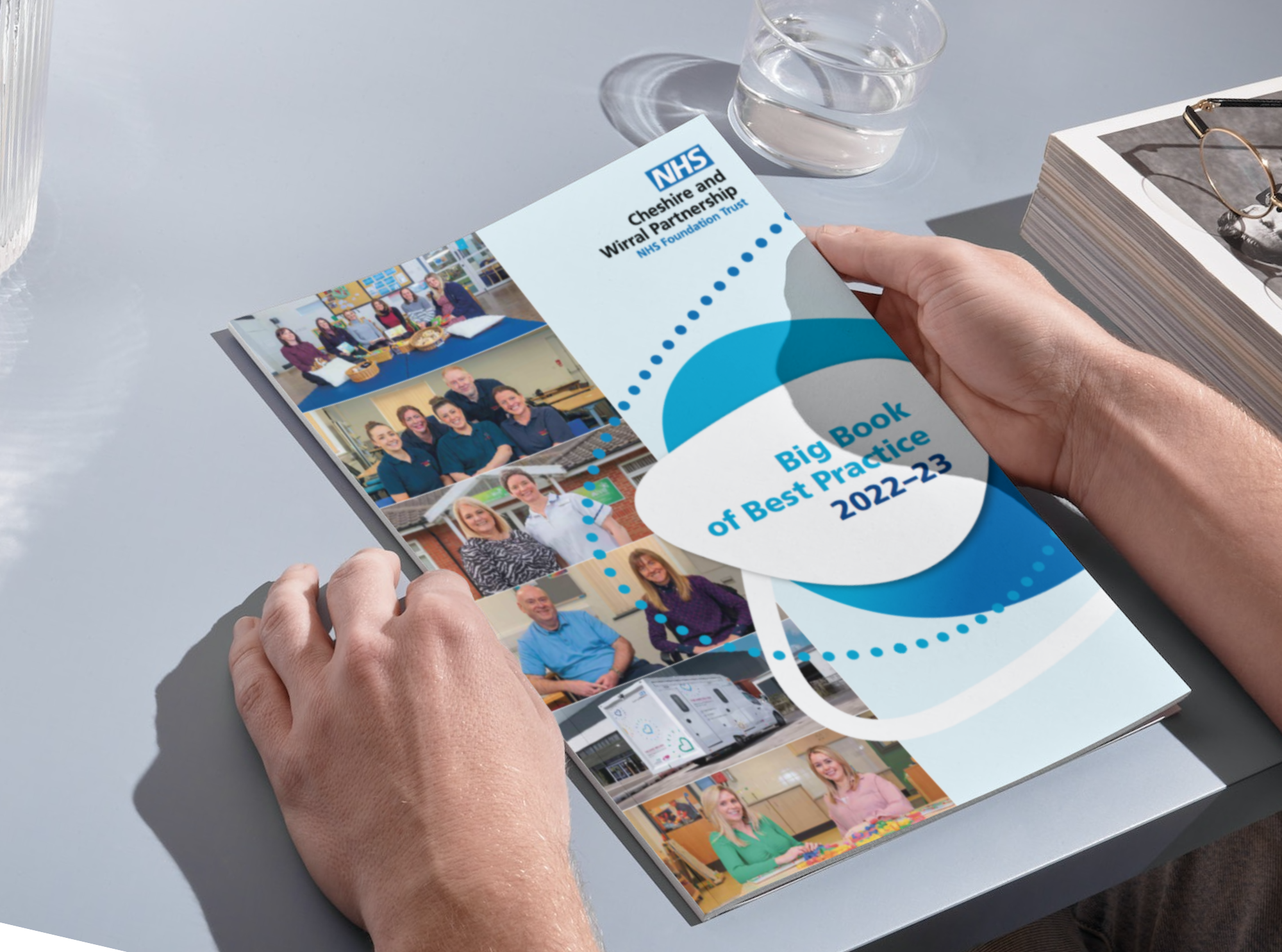Below you can view all the entries that made it into the Big Book of Best Practice 2022-23 from the specialist mental health and all age disability services care group.
Contact details for each project can be found within the entries below. For more information about the Big Book of Best Practice, email cwp.
Team: Medical Student Balint Group
Contact: annette.
What did we want to achieve?
The issue of health and wellbeing amongst the NHS workforce has never been so prominent. Balint groups are facilitated discussion sessions aiming to help clinicians reach a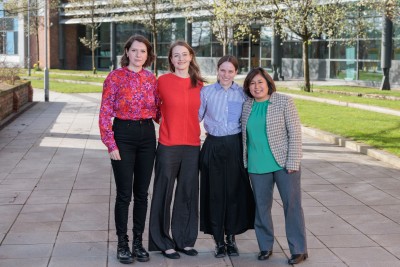
What we did
The team approached the University of Liverpool’s School of Medicine, which did not have a formal Balint programme in place, and proposed a pilot Balint scheme
with fourth year medical students rotating through psychiatry in CWP. Sessions were conducted in four week blocks, during a student’s psychiatry rotation, and were facilitated by two psychiatry trainees. At the end of each block, anonymised feedback was collected, and small alterations were made to the programme during the course of the pilot in response to attendance rates, punctuality and feedback.
Results
- A total of 143 students participated in the programme in the first 11 cohorts, between September 2021 and December 2022, and 72 (50.3%) submitted feedback forms
- 98.6% agreed that the programme helped them reflect more on their interactions with patients, and that it helped them gain insight into how others think and feel when caring for patients.
- 91.7% enjoyed the groups and 97.3% would use the skills learnt in Balint group in the future.
- 100% of students gave a positive response when rating their overall experience of the programme.
- Facilitators reported increased confidence in their psychotherapeutic knowledge, and an improvement in leadership and communication skills.
Next steps
The student experience of the Balint programme was positive for the vast majority, and from a facilitator perspective, their involvement has been very rewarding. Psychiatry trainee group facilitation was well-received by students, allowing a greater number of groups to run, and is beneficial for trainees’ professional development. Before the pilot, approximately one third of the University of Liverpool’s medical students had the opportunity to attend a Balint group. However, the findings of the programme have contributed to a decision by the University of Liverpool to extend the scheme to all fourth year students on psychiatry placement from August 2023.
Team: Personality disorder training team
Contact: amrith.shetty1@nhs.net
What did we want to achieve?
To achieve positive health outcomes for those with a diagnosis of personality disorder (PD) or for those who have similar experiences. By doing this, the PD training team has engaged with staff by offering a safe space to speak about working with this client group. The training has been available for nearly two years, and to date, nearly 100 people have been trained in levels one and two.
What we did
The team was able to co-produce a training programme based on the professional experience of a clinical psychologist Dr Samantha Woodley, and the personal experience an expert by experience, Joe. The training was available to support staff who care for those with a diagnosis of personality disorder. The team was able to discuss important topics such as occupational burnout and also the realistic recovery of those with the diagnosis. The goal was to improve service users' experiences and to improve staff skill set.
Results
A questionnaire was co-developed to evaluate staff attending the training and they were asked to complete this at the end to provide feedback. This also included a qualitative section for staff to share their views, a bespoke Likert scale to measure feedback quantitatively. The average feedback score from all training was 9 out of 10.
Staff who attended the training said:
- "It helped me think more deeply about how someone with a diagnosis of borderline personality disorder may feel, think and react."
- "Friendly, engaging and enjoyable."
- "Very educational."
- "Joe's speech was really moving and insightful. Pitched at a really clear, helpful level."
The training programme outcomes from May 2021 to January 2022 were audited. In this period, incidents on CWP’s Rosewood Intensive Rehabilitation Unit reduced.
| Training | Incidents | Self-harm incidents |
|---|---|---|
| Jan-Mar 2023 | 115 | 46 |
| Jan-Mar 2023 | 46 | 23 (50% reduction) |
Next steps
The Trust has now introduced the training as mandatory for staff working within specialist mental health, demonstrating CWP’s understanding of the importance of training and supporting staff when working with this client group. The training includes developing a level one e-learning package as an introduction to working with people with a diagnosis of personality disorder, which will help staff from across CWP to access pivotal information about these highly stigmatised conditions. This also relates to the Trust’s development of lived experience co-facilitator roles, where people with lived experience can be employed to share experiences and knowledge on this topic.
Team: Integrated Disability Service / Children with Disabilities / mental health teams
Contact: judith.lambert1@nhs.net
What did we want to achieve?
The team wanted to develop an integrated digital tool to ‘quality assure’ social care records to improve patient care, recognise good practice and track improvements. It was important that this tool was part of the Liquid Logic database so information from the record, copied into it, and those completing the audits could then log and track any actions, as well as noting good practice. Liquid Logic is the local authority database system and is the main system used in the All Age Disability Service. The tool needed to be quantitative and qualitative, and the aim was to be in a good position for when social work services start to be regulated by the Care Quality Commission from April 2023.
What we did
CWP management led the project on behalf of the wider Wirral social care system to design and implement the audit tool. The team ensured key questions that evidenced a strong value base and person-centred practice were included, as well as evidencing that statutory duties were also carried out to a high standard. Once testing and staff training had been completed, the quality assurance tool went live in April 2022 and is now an integral part of Liquid Logic for CWP and Wirral Community Health and Care NHS Foundation Trust colleagues to use as part of their quality assurance process.
Results
Regular performance reports are received on the numbers of audits completed, as well as the detail of actions and themes for learning. This is then shared in CWP’s monthly quality, safety and learning meetings. CWP has now completed around 100 audits, with the uptake now embedding well into practice. Reminders have been issued to staff based on these audits regarding, for example, Mental Capacity Act and carers’ assessments, which are key statutory duties that need to be completed.
Next steps
Progress will continue to be reported on a monthly basis and a summary report is planned to look at all of the actions and learning, to then consider as part of business and development planning for the year ahead. The team regularly meets with Liquid Logic colleagues to review and amend the tool as needed. We expect, for example, some changes to be needed as Liberty Protection Safeguards are implemented.
Team: Integrated Disability Service 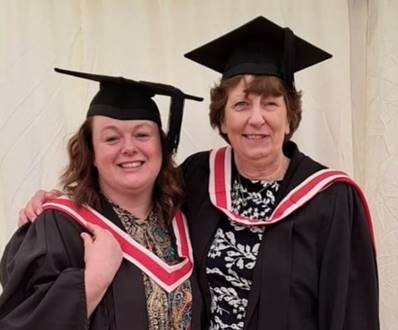
Contact: judith.lambert1@nhs.net
What did we want to achieve?
The Integrated Disability Service (IDS) wanted to create a career progression pathway for ‘unqualified’ staff so that they could see a route to a formal qualification and feel valued by the organisation. It was delt that this would improve retention and morale, and also support with some recruitment challenges with a ‘grow our own’ approach to the ongoing recruitment of social workers.
What we did
In 2019, the IDS worked in partnership with the University of Chester to agree a degree apprenticeship programme and a nomination process. Two staff initially embarked on the programme - a care navigator in the Integrated Disability Service and a family support worker in the Children with Disabilities Service. Another colleague also started the apprenticeship the following year and has deferred. All three staff have been supported by their managers with their studies and have had a range of placements in CWP to give them a wider range of experience.
Results
The care navigator and family support worker will shortly complete their degrees and become qualified social workers. They will then move into vacant social work roles in services and be supported in the next stage of their careers (the assessed and supported year in employment). Both report that whilst it has been challenging at times to fit in all of their work and studies, alongside personal commitments, they have been well supported throughout the last three years and they have been able to secure a degree in social work without any of the student debt that others would encounter if they followed a more traditional route of academic study.
Next steps
Existing staff are still able to apply for the degree apprenticeship, and this has now been widened out to new recruits. A new job description has been agreed that will be advertised imminently for an even wider range of internal and external staff to apply for. The aim is to give a wide range of people this unique chance to have a funded degree programme to achieve a qualification for roles that are always in demand. It is also hoped that this approach will encourage staff working in social care provider services to take the next step in their careers and join Team CWP.
Team: First Response Services (Wirral) – Liaison and Home Treatment Team
Contact: angela.

What did we want to achieve?
CWP formed a partnership with third sector organisation, The Martin Gallier Project (MGP), to help reduce A&E attendances, by referring patients who are experiencing a
mental health crisis and feeling suicidal. MGP is fiercely dedicated to preventing suicides, breaking down stigmas and supporting families, including those bereaved by suicide. The organisation was established by Jessica Gallier as a direct response to the impact of the death by suicide of her father Martin in 2017. As a result, in 2019 the UK’s first suicide prevention, intervention and postvention service opened its doors.
What we did
In 2021 CWP began a pilot with MGP - the first of its kind in the UK The charity consists of 15 members of staff, many of whom have been personally affected by suicide. Deryn, who is Head of Services and Operations at MGP, lost her brother to suicide in 2020. Since beginning this partnership, when someone presents at A&E with thoughts of suicide, or following an attempted suicide, they are referred to MGP. Within 24 hours of receiving the referral, a dedicated Suicide Intervention Worker contacts the individual.
Results
Ten people were selected between June and July 2021, who were then referred to MGP from CWP. Prior to their referral to MGP, between them, they had presented at A&E a total of 45 times. However, since their referral, this has decreased to 12. Having support from MGP has improved outcomes for people. When patients present at A&E, this can lead to an inpatient admission, which costs upwards from £300 per day, which increases when interventions and observations are required. This could mean an admission would be required for a minimum 72-hour assessment period, costing at least £900. Through the support people receive from MGP, these admissions can be avoided.
Nominated in the ‘Best Mental Health Partnership’ category at the Health Service Journal Partnership Awards, the initiative has already started to make a significant difference to people struggling with their mental health. 80% of people referred have engaged in treatment and support and of those, there has been a 73% reduction in re-attendance at emergency departments.
Next steps
Having seen the positive impact that MGP has been having in the Wirral area, CWP is looking to support MGP in expanding into other areas covered by the Trust. The charity is currently looking for high street premises in the Chester or Ellesmere Port area, which would support the teams in West Cheshire. This will help to ease pressure on the A&E department at the Countess of Chester Hospital, as this would be an alternative third sector provider, which would provide a more appropriate setting for people in mental health crisis.
Team: Specialist Perinatal Mental Health Team
Contact: kate.lawrence10@nhs.net
What did we want to achieve?
The aim was to develop and pilot an antenatal wellbeing group for service users with mild to moderate levels of anxiety or depression, with a view to increasing access to evidence-based psychologically informed support within a maternity setting.
The group aims were to:
- Increase understanding of perinatal mental health and improve emotional and mental wellbeing through early intervention, to prevent subsequent deterioration.
- Provide strategies to manage anxiety, low mood, worry and intrusive thoughts more helpfully.
- Discuss changes in pregnancy that can impact on the emotional wellbeing and support transition to motherhood.
- Promote understanding of attachment and early postnatal bonding.
- Provide peer support and normalising of experiences by connecting women with others who are going through a shared experience of pregnancy.
What we did
The team piloted two eight-session antenatal wellbeing groups (one delivered face-to-face, one virtually) covering a range of topics including an introduction to perinatal mental health, changes in pregnancy, antenatal anxiety and low mood, understanding and managing intrusive thoughts, transition to motherhood, antenatal attachment and early postnatal bonding. One session was aimed at supporting fathers and partners, and the final session was a celebration event. This was designed to increase signposting to support within the community to facilitate early intervention and prevention of subsequent mental health difficulties within the perinatal period. The sessions were delivered by a specialist mental health midwife at Leighton Hospital, 0-19+ mental health practitioners, a clinical psychologist from the Specialist Perinatal Mental Health Team and the Talking Therapies team’s perinatal champion and cognitive behavioural therapist.
Results
Qualitative feedback received included:
- “Sessions were really useful and I learned helpful tools.”
- “Great having different specialists and professionals.”
- “Would 100% recommend to other expectant mums.”
- “I feel much more bonded to my baby.”
- “As a first-time mum it was particularly useful.”
On a scale from 0 (not at all) to 100 (completely) all attendees rated higher than 70 on ‘session content covering what they wanted to focus on’ and ‘feeling understood and comfortable’.
Next steps
- Run a third pilot in 2023 through Leighton Hospital.
- Pilot antenatal wellbeing groups in further localities (Cheshire East and Wirral) specifically through Macclesfield and Arrowe Park maternity hospitals.
Team: Cheshire East and West Individual Placement and Support (IPS) services
Contact: louise.
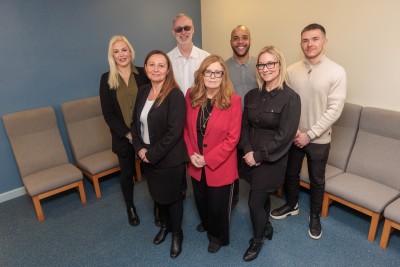
What did we want to achieve?
Individual Placement and Support (IPS) is an internationally recognised, evidence-based approach to supporting people with severe mental health problems achieve and retain employment. Standguide employment specialists are integrated within community mental health and early intervention teams across Cheshire East and Cheshire West and Chester. Embedding IPS delivery within the recovery model as employment is an integral part of services beyond simply providing clinical interventions.
What we did
IPS support people with severe mental illness (SMI) into employment. This involves intensive, individual support and a rapid job search, followed by placement in paid employment, and up to 26 weeks in-work support for both the employee and the employer. The following steps have been taken:
- Meaningful pathways have been created to support clinical staff in managing individuals in their recovery and increasing wellbeing through employment.
- Electronic patient record via SystmOne have been used to update individuals’ progress.
- Building strong partnerships with local and national employers to support competitive employment for individual vocational requirements.
- Supporting individuals to improve their wellbeing by removing work related barriers in achieving employment.
Results
Employment specialists have integrated with clinical teams. The employment specialists’ attend weekly team meetings, working collaboratively to ensure both clinical and IPS staff discuss progression and ways to increase wellbeing of the individual.
The service secured extra funding in 2022 to recruit two new employment specialists. This increased capacity sees a full-time specialist in each clinical teaming the service and each clinical team had one full time employment specialist.
Standguide has exceeded all contractual targets since the Trust commissioned the service in 2019 and achieved an ‘exemplary’ fidelity score in 2022, which was the highest scoring service in the country and secured the ‘quality mark’. The service has created a full wraparound care approach by creating pathways with other commissioned services and local providers to signpost when employment is not the primary focus. From October 2019 to March 2023, a total access of 678 received support during this time.
Next steps
- Securing longer term funding against the NHSE long-term plan for IPS service continuation aiming for a more permanent contract to secure the IPS service as a recognised recovery delivery model as part of CMH Transformation.
- Creation of a steering group, including executive directors, service users, IPS staff and stakeholders to codevelop the service going forward once longer-term funding is secured.
- Continue to work in partnership with IPS grow leads to increase knowledge of best practice.
Team: Cheshire and Merseyside NHS Talking Therapies Supervision Hub
Contact: rachel.
What did we want to achieve?
The aim was to allow the Cheshire and Merseyside NHS Talking Therapies Services to expand and develop their workforce in line with the 2023/24 NHS Mental Health Long Term Plan targets. In order to grow the workforce, a large number of trainee psychological wellbeing practitioners would require supervision but the existing system was unable to sufficiently support the level of workforce growth required.
The concept of a centralised Integrated Care System (ICS) supervision hub was approved, and the service is hosted by Cheshire and Wirral Partnership. The approach aims to:
- Support collaborative working and provide increased supervision support across the ICS.
- Encourage NHS Talking Therapies workforce growth, competence, resilience and wellbeing.
What we did
The development of the supervision hub model involved:
- A supervision scoping exercise to identify the level of need across the 10 Cheshire and Merseyside NHS Talking Therapies services.
- Establishing good working relationships with key stakeholders (service managers, clinical leads, higher education institutions and trainees), with open and transparent communication.
During the mobilisation and implementation stages of the hub’s development, with the oversight of the Acting Head of Clinical Services, the team of senior psychological wellbeing practitioners and an assistant clinical lead were recruited and trained. Each of the Cheshire and Merseyside NHS Talking Therapies services involved in the collaboration process signed a service level agreement outlining the key responsibilities of all of the involved parties.
Results
The supervision hub is an innovative service that went live in March 2022. Through the hub, 63 trainee psychological wellbeing practitioners are offered clinical skills supervision and clinical case management supervision. Five trainee high intensity therapists and two qualified high intensity therapists are offered clinical supervision.
The team has recently completed their first year service evaluation, including a survey completed by 30 trainee psychological wellbeing practitioners, of which 93.3% rated their experience of external supervision as five out of five. Other qualitative data showed that trainees felt very positively about external supervision and believed that it contributed to their wellbeing, confidence and competence as practitioners. They particularly rated their supervisory alliance and the safe space created in clinical skills supervision.
Next steps
To strategically develop the supervision hub and widen its remit to include workforce and service development projects. Within 2023/24, the team will expand to include an eye movement desensitization reprocessing consultant, counselling for depression and interpersonal therapy supervisors. The team will undertake projects to encourage step 2 workforce development and retention opportunities. Additionally, the team will continue to share best practice with local, regional and national colleagues who have an interest in creating more supervision hubs across the country within other psychological professions.
Team: Criminal Justice Liaison and Diversion Team
Contact: shelley.
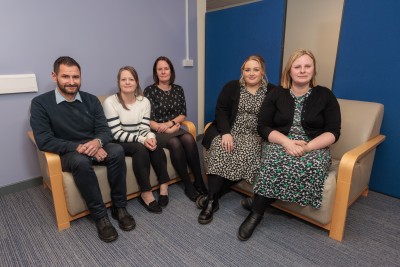
What did we want to achieve?
To ensure that all voluntary attendees (people who may have committed an offence but have not been arrested) within the criminal justice system are offered a referral into the Criminal Justice Liaison and Diversion Team (CJLDT). The overall aim is to reduce health inequalities, improve access to health and social care, and reduce reoffending.
What we did
The CJLDT linked in with key stakeholders to discuss and implement pathways and processes. This included staff members, managers, police, IT, health partners and peer support workers. Once the pathway was agreed, the team initially tested it before it was launched to staff and the wider partnership.
Twice a day an email is generated from the police system into a shared email account with details of any referrals. The mailbox is checked and a referral is then generated. Contact details are obtained and a member of the CJLDT attempts to contact the individuals who have been referred to offer a screening assessment and consider any further face-to-face assessments.
Results
73% of all voluntary attendances were referred to liaison and diversion in 2021/22 - the second highest rate in the country.
Based on the statistics and innovative work, the CJLDT was invited by the national liaison and diversion team to present at their conference, where the team was able to share their experiences and learn from other services.
Qualitative feedback received from the conference included:
“I just wanted to record my grateful thanks for giving up your time to present at yesterday’s conference. You spoke very well and delivered a well-balanced presentation to give the audience something to think about going forward.”
Next steps
The project highlighted:
- A gap in service as not all voluntary attendances are referred into the CJLDT. Therefore, a review of the current pathway with key stakeholders is required.
- Training will be offered to all police officers and the police are hoping to embed this into mandatory training via an e-learning package.
Team: Bowmere Occupational Therapy Team
Contact: maria.yuen@nhs.net
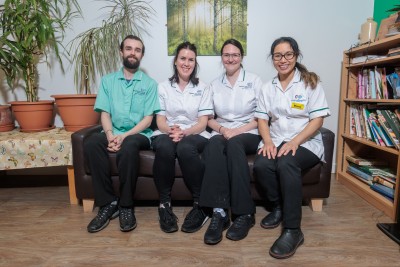
What did we want to achieve?
The team wanted to organise a festive event that would involve service users managing a creative project and improving the environment at Bowmere Hospital. The aim was also to bring together service users from all of the wards to create a sense of community and celebrate Christmas.
A Christmas Tree competition was launched where service users and staff from each ward could decorate a Christmas Tree on a theme of their choosing. The trees were then displayed around the hospital.
What we did
Each ward was given an identical Christmas tree. Service users and occupational therapy staff then worked together to decorate each tree based on a theme of their own choice. This was a group activity which was discussed at community meetings, and decorations were crafted during therapy activity groups.
An afternoon event was held in mid-December, when all of the trees were displayed in the Oasis Café, with all staff and service users at Bowmere Hospital invited. There were festive drinks and cakes which were made by service users. Staff also organised some art-based activities and festive quizzes. A prize for the best tree was awarded by the modern matron and head of clinical services.
Results
The Christmas Trees on display were decorated with a lot of detail and care, with service users involved in developing ideas and the actual crafting and assembly of the decorations. The winning tree was from Cherry Ward, themed ‘When You Wish Upon a Star’, with Christmas wishes written by Cherry Ward service users and staff. One of the wishes was from a service user who has dementia, expressing love for his family, and this was shown to his wife who was very pleased to have the decoration after the event had finished. Other themes included ‘National Elf Service’ and ‘Harry Potter’.
The event involved a collaborative planning effort with staff across acute and rehabilitation wards; and was very well attended with around 15- 20 service users and around 10 staff. The trees were on display around Bowmere for the duration of Christmas and each ward wards were awarded a certificate.
Next steps
The Christmas Tree Festival was a success, and the Bowmere Hospital teams plan to make this an annual event. There is also scope for more carer and family involvement in the future, for example, having a carers event at the Oasis Café with the trees on display. There is also scope for similar events for other cultural days throughout the year.
Team: Rehabilitation and Acute Care
Contact: emma.
What did we want to achieve?
The aim was to work collaboratively with an organisation called The Reader, which runs shared reading groups internationally, for individuals in their community. They support more than 2,000 people in the North West alone.
The Reader provides these groups in a variety of settings, including libraries, care homes, prisons, and hospitals. The Rehabilitation and Acute Care team wanted this Reader Group to be available for their own service users and staff at Bowmere Hospital.
The organisation has an evidence base which shows that people who attend the groups experience improved wellbeing, feel more connected to others, have a greater sense of purpose and belonging, and greater connection with literature.
What we did
Two occupational therapy staff completed a training course provided by The Reader organisation, which enabled them to facilitate these groups. A volunteer from The Reader joined CWP’s volunteering service and supports facilitation of the group. Facilitation of a weekly group at Bowmere Hospital was planned for service users of acute care, rehabilitation and dementia services to attend.
Results
Feedback was obtained from service users at Bowmere Hospital to establish if the group was beneficial to them. This included:
- “Coming together as a group to share reading is a very productive and thought-provoking activity.”
- “Interesting, helpful, rewarding and fun.”
- “Stimulating and constructive.”
- “Calming and delightful.”
- “Exciting, rewarding and helpful.”
“I really enjoyed facilitating the group. It has been surprising to hear service users talk about their own experiences and relate back to the literature, and for individuals to open up about their feelings.” – Occupational therapy staff member
Next steps
- To continue to run the group each week and to train further staff to implement the groups to sustain this.
- Review how to promote the group to make it accessible for more people.
- Potentially increase to two groups a week with a second volunteer, focusing on dementia care for the second group.
Team: First Response Service
Contact: sue.jenkins4@nhs.net
What did we want to achieve?
- Improving the patient journey to ensure people receive the right care, at the right time and by the right person.
- 24/7 community-based mental health response.
- Crisis care for all.
- Post-crisis support for families, carers and staff following bereavement by suicide.
- Alternative places for individuals in crisis, including working with third sector colleagues.
What we did
Multiple services across the mental health teams in Cheshire and Wirral were combined to streamline services and improve the service provided, meaning teams could interlink with each other and provide a more flexible service that could respond to clinical demand by the hour, 24 hours a day, seven days a week.
Results
- A reduction in A&E attendances and reduced pressure on emergency services, including police, ambulance and A&E services.
- Fewer service users having to wait in A&E departments whilst experiencing a mental health crisis.
- Staff are being mobilised and upskilled in different areas, which is giving a greater understanding of the First Response model.
- Reduction in work-based stress and burnout.
- Closer working relationships with third sector partners.
Next steps
- To continue to evolve and improve the services within First Response.
- To maintain a high level of service whilst moving premises, to have more elements of the First Response model based together in one building, as this was identified as an improvement.
Team: Clinical Pharmacy team
Contact: jennifer.
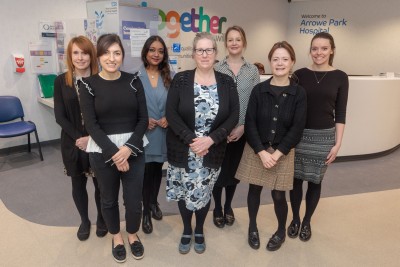
What did we want to achieve?
Introduce a new approach to providing improved pharmaceutical care to people taking mental health medicines in the general hospital setting. CWP and Wirral University Teaching Hospitals (WUTH) pharmacy teams work together to deliver a higher quality of care to patients with mental health conditions presenting at WUTH in line with the National Confidential Enquiry into Patient Outcome and Death’s ‘Treat as One’ strategy, which looks to bridge the gap between mental and physical healthcare in general hospitals.
What we did
CWP’s Deputy Chief Pharmacist and WUTH’s Director of Pharmacy and Meds Optimisation agreed a contract enabling CWP’s Senior Clinical Mental Health Pharmacist to be based, one day a week, at Arrowe Park Hospital’s pharmacy, providing advice and support around mental health medicines to pharmacy staff at Arrowe Park. An initial scoping period reviewed how the teams work currently. Through mental health pharmacy education, WUTH’s pharmacy staff will be better enabled to identify interventions and deliver better care to people taking mental health medicines.
Results
Between May 2022 and January 2023, 75 pharmacy staff have received training and support provided for 243 multi-faceted intervention
Some of the comments received include:
- “Thanks so much, this is really useful.”
- “We are lucky to have you.”
- “Feedback from your session has been great!”
- “It was very interesting. Clearly you only scratched the surface on what you can share with us. Much appreciated.”
Next steps
- CWP’s Clinical Pharmacy Team has already discussed the approach and shared resources with Health Education England’s Mental Health Champions Project.
- The plan is to re-evaluate and change focus of the training to pharmacy personnel rather than directly to patients on specific medicines.
- Arrowe Park Hospital Pharmacy would like to increase the number of days CWP’s mental health pharmacist is present and other acute trusts and primary care network pharmacy staff have expressed an interest too.
Honorable mentions
With nearly 100 entries received for the Big Book of Best Practice 2022-23, we have unfortunately been unable to include every entry in the final book. However, many of the projects – despite not being selected for full publication – deserve to be celebrated for the fantastic outcomes achieved.
You can view the honorable mentions for the specialist mental health and all age disability services care group below:
- Integrated Disability Service (IDS) - Makaton Training
- Mental Health Intensive Support Team and Mental Health Out of Area Team (Formerly CRAC) - Implementing Open Dialogue
- Liaison Psychiatry Central - Mental health safety plans for mental health patients in A&E
- Bowmere Occupational Therapy Team - Men’s Group
